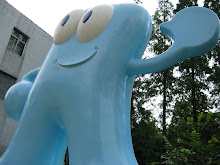The Chinese logic is that the bone possesses a magnetic pull on all the flavor particles contained in a given piece of meat, and therefore, the concept of a chicken breast is nothing more than a bland abomination. It’s no wonder chicken feet are such a popular dining item, as they contain more bones per square inch than any other part of the body. So, it could be argued that KFC’s Chinese success is due entirely to its wide assortment of bone riddled ji rou (chicken).
Despite the fact that KFC is the fast food of choice, the holy grail of American influence lies below the golden arches in the heart of downtown Huzhou. The lone “Mai Don Lao” seems to be the centerpiece of the city, the capitalist bull’s-eye, located in the exact geographic center of the map. It features two fluorescently lit floors, open 24 hours a day, vigilantly watched over by none other than Ronald himself, whose life-size plastic incarnation occupies a permanent seat on the bench at the entrance. In Ronald’s immediate vicinity, opportunities abound for purchasing whatever random item seems appropriate at the given moment. Peddlers of baby turtles battle for position with puppy pushers, who pack their furry merchandise in cages as tightly as a box of cigarettes. In typical downtown fashion, a great wall of scooters surrounds the perimeter.
 As if this setting wasn’t confusing enough already, I was further perplexed by stumbling upon a disgusting display of consumerism, that I will admit was equally entertaining. Like the aftermath of a gruesome car accident, I couldn’t bear to watch, but I couldn’t look away either.
As if this setting wasn’t confusing enough already, I was further perplexed by stumbling upon a disgusting display of consumerism, that I will admit was equally entertaining. Like the aftermath of a gruesome car accident, I couldn’t bear to watch, but I couldn’t look away either.A Mai Don Lao employee, decked out in heels and a mini skirt, cordless microphone in hand, was leading a dozen of Huzhou’s most adorable and impressionable knee-high residents through an aerobic workout. Twenty four bright, eager eyes were glued in an upward gaze, awaiting instruction in an improvisational song and dance routine. Parents, and innocent bystanders like myself observed the proceedings, generously applauding the performers. As the class winded down, the instructor led the lemmings, who had obviously worked up a value meal sized appetite, directly past Ronald’s grinning likeness, into the fluorescent Promised Land. There, they were bombarded by larger than life images of Big Mac’s, which will forever be engrained in their psyche as the happy place where you get to dance and eat hamburgers.
China has opened up the floodgates of western influence, and marketing departments everywhere are salivating at the ocean of opportunity that is business in modern China. Unfortunately, the euthanasia may be ripe for the picking for the sole fact that they’re the 2nd generation of the one child policy.
In my attempts to make small talk with people, I often mistakenly ask if they have any brothers or sisters. The answer to this question is always no for anyone born after China's one child policy was implemented in 1979. This generation has been dubbed 'the little emperors' because they are a mass of supposedly spoiled single children. Many of the people I’ve talked to confirm these allegations, with their personal opinions, but not necessarily their behavior. Those little emperors are now having children of their own, which you could call the little Napoleons. A recent amendment to the policy allows couples to have two children, provided they are both single children. Citing mostly economic reasons, many who have been granted this opportunity are passing it up, keeping the one child family alive for at least one more generation. There will now be only one grandchild for every 4 grandparents. Translation; children who will likely be spoiled beyond Mao’s wildest nightmares, and the guaranteed future propagation of KFC and Mai Don Lao.









